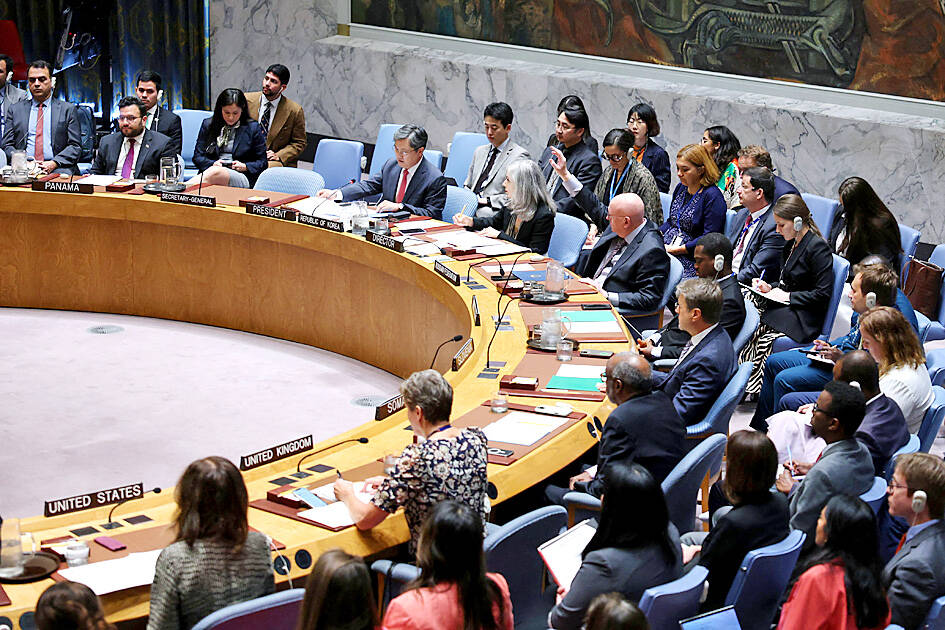A UN Security Council resolution aimed at halting the reimposition of sanctions on Iran over its nuclear program failed on Friday after weeks of last-ditch diplomatic talks appeared to break down days before the annual UN gathering of world leaders.
The resolution put forth by South Korea, the president of the 15-member council, did not garner the support of the nine countries required to halt the series of sanctions from taking effect at the end of the month, as outlined in Iran’s 2015 nuclear deal with world powers.
Only four countries — China, Russia, Pakistan and Algeria — supported the effort, with some using the meeting to blast the European leaders for what they called an unjustified and illegal action against Iran.

Photo: AFP
France, Germany and the UK moved last month to trigger the “snapback mechanism,” which automatically reimposes all UN sanctions that were in effect before the nuclear deal.
Those penalties included a conventional arms embargo, restrictions on ballistic missile development, asset freezes, travel bans and a ban on producing nuclear-related technology.
Using the snapback mechanism would likely heighten tensions between Iran and the West. It is unclear how Iran would respond, given that officials have previously threatened to withdraw from the Nuclear Non-Proliferation Treaty.
Iran’s Ministry of Foreign Affairs on Friday emphasized its commitment to safeguarding its interests and rights, including through diplomacy, and said it reserves the right to respond appropriately to any unlawful action.
Iranian Minister of Foreign Affairs Abbas Araghchi has said that the reimposition of UN sanctions was “lacking any legal or logical justification.”
He also pointed to the fact that Iran and the International Atomic Energy Agency (IAEA) earlier reached a deal to grant the watchdog access to all Iranian nuclear sites and for Tehran to report on the whereabouts of all its nuclear material.
IAEA Director Rafael Grossi last week said that the agreement “includes all facilities and installations in Iran and it also contemplates the required reporting on all the attacked facilities including the nuclear material present at those.”

STEPPING UP: Diminished US polar science presence mean opportunities for the UK and other countries, although China or Russia might also fill that gap, a researcher said The UK’s flagship polar research vessel is to head to Antarctica next week to help advance dozens of climate change-linked science projects, as Western nations spearhead studies there while the US withdraws. The RRS Sir David Attenborough, a state-of-the-art ship named after the renowned British naturalist, would aid research on everything from “hunting underwater tsunamis” to tracking glacier melt and whale populations. Operated by the British Antarctic Survey (BAS), the country’s polar research institute, the 15,000-tonne icebreaker — boasting a helipad, and various laboratories and gadgetry — is pivotal to the UK’s efforts to assess climate change’s impact there. “The saying goes

FRUSTRATIONS: One in seven youths in China and Indonesia are unemployed, and many in the region are stuck in low-productivity jobs, the World Bank said Young people across Asia are struggling to find good jobs, with many stuck in low-productivity work that the World Bank said could strain social stability as frustrations fuel a global wave of youth-led protests. The bank highlighted a persistent gap between younger and more experienced workers across several Asian economies in a regional economic update released yesterday, noting that one in seven young people in China and Indonesia are unemployed. The share of people now vulnerable to falling into poverty is now larger than the middle class in most countries, it said. “The employment rate is generally high, but the young struggle to

ENERGY SHIFT: A report by Ember suggests it is possible for the world to wean off polluting sources of power, such as coal and gas, even as demand for electricity surges Worldwide solar and wind power generation has outpaced electricity demand this year, and for the first time on record, renewable energies combined generated more power than coal, a new analysis said. Global solar generation grew by a record 31 percent in the first half of the year, while wind generation grew 7.7 percent, according to the report by the energy think tank Ember, which was released after midnight yesterday. Solar and wind generation combined grew by more than 400 terawatt hours, which was more than the increase in overall global demand during the same period, it said. The findings suggest it is

TICKING CLOCK: A path to a budget agreement was still possible, the president’s office said, as a debate on reversing an increase of the pension age carries on French President Emmanuel Macron yesterday was racing to find a new prime minister within a two-day deadline after the resignation of outgoing French Prime Minister Sebastien Lecornu tipped the country deeper into political crisis. The presidency late on Wednesday said that Macron would name a new prime minister within 48 hours, indicating that the appointment would come by this evening at the latest. Lecornu told French television in an interview that he expected a new prime minister to be named — rather than early legislative elections or Macron’s resignation — to resolve the crisis. The developments were the latest twists in three tumultuous